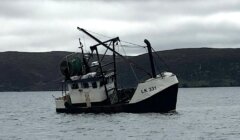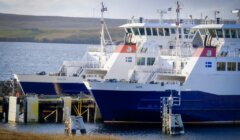Marine / Swinney gives commitment to ensure that fishing and offshore wind can co-exist
FIRST minister John Swinney has given a commitment to ensuring the fishing industry and the offshore marine energy sector can exist together.
It followed a stark warning by Elspeth Macdonald, the chief executive of the Scottish Fishermen’s Federation, that floating wind farms and the fishing sector are “simply not able to co-exist”.
Speaking at last week’s SFF dinner, Macdonald called on the government to actively protect the fishing industry from the encroaching offshore wind industry.
One example quoted by the industry is the proposed 500MW Stoura wind farm, 40 miles to east of Shetland, which could be built on top of prime fishing grounds for both the whitefish and the pelagic sector.
During a visit to Lerwick fish market on Monday Swinney was left in no doubt of the importance of the fishing industry to the islands.
Speaking to Shetland News, the first minister said: “We’ve got to proceed with care and an atmosphere of open dialogue to address some of these issues.
“The solution to these challenges is to have effective marine spatial planning where we work together to understand the needs of the fishing industry and the needs of the offshore energy sector to make sure we can create an environment of co-existence.”
He added: “We have to make sure that we make the satisfactory transition to net zero but we have also to make sure that livelihoods can be sustained that are absolutely vital no only to the health and wellbeing of communities here in Shetland and other parts of Scotland, but also that we have got food stocks for our country and population so that we can continue to eat healthily of the produce that is landed here.
Become a member of Shetland News
“That emphasis on marine spatial planning to me is absolutely fundamental as to how we proceed.
“I will certainly be giving that commitment that marine spatial planning is the way that we’ve got to work together to find common ground and to find a way that all these different elements of economic activity can co-exist.”
In addition to the issue of what has been described as the ‘spatial squeeze’, fishermen leaders have also been raising concerns about the implementation of the landing obligation. Under Scottish Government rules pelagic vessels are required to land 40 per cent of their catch in Scotland – a percentage that is to rise to 55 per cent next year.
While the industry is principally not against the policy, it has concerns over its implementation and the price setting power it hands to Scottish fish processors.
Executive officer of the Shetland Fishermen’s Association Sheila Keith said: “We are calling for more meetings with government to discuss the implementation of the landing obligation.
“Whilst we can all agree on the aims and objective of that, implementation is lacking in ensuring a win-win situation for processors and catchers.”
Become a member of Shetland News
Shetland News is asking its many readers to consider paying for membership to get additional features and services: -
- Remove non-local ads;
- Bookmark posts to read later;
- Exclusive curated weekly newsletter;
- Hide membership messages;
- Comments open for discussion.
If you appreciate what we do and feel strongly about impartial local journalism, then please become a member of Shetland News by either making a single payment, or setting up a monthly, quarterly or yearly subscription.



















































































